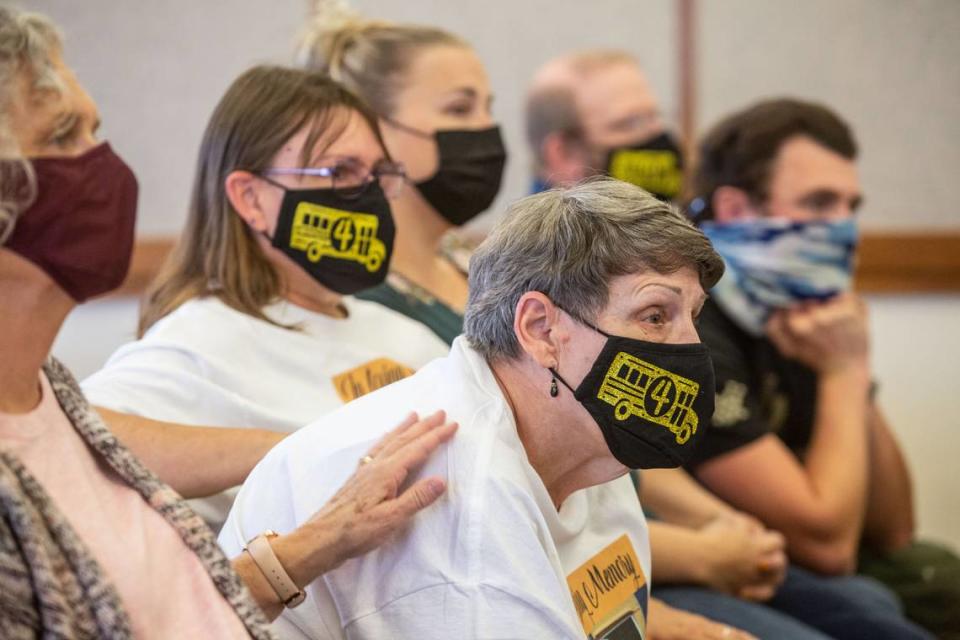‘I’ve murdered children.’ Man accused of killing Pasco bus driver left a chilling note
Before stabbing to death a Pasco school bus driver, Joshua D. Davis wrote a note for his roommate and left it in her bedroom while she was away.
“If you are reading this, then I’ve murdered children,” he wrote, then told her how to give his three cats to his mom.
The letter was one of the items Washington state psychologists are now saying shows Davis understood the consequences of his actions in September 2021, proving he is sane and can go on trial for premeditated murder.
Davis, 36, previously pleaded innocent by reason of insanity for killing Richard “Dick” Lenhart in the driver seat of a bus full of elementary school kids. Lenhart, 72, had opened the bus doors to answer a question from Davis.

The state psychologists findings contradict another psychologist hired by the defense who concluded that Davis’ schizophrenia made him unable to understand the consequences of his actions.
Both sides agree that he has suffered from schizophrenia for years.
His mental illness manifested in beliefs that government agents targeted him with ultrasonic weapons, giving him debilitating headaches.
Still, he was living on his own, holding a series of short-term jobs, including a year as a para-educator at Twain Elementary School in Pasco from September 2017 until December 2018.
He left each of those jobs because of severe headaches, according to the state’s psychological report. A few weeks before the attack, the continuing headaches forced him to quit his job at an AutoZone parts store, writing his resignation letter in crayon.
Davis would later tell state examiners that his headache on the day of the stabbing, Sept. 24, 2021, was so bad that he can only remember waking up that day and then his arrest, but almost nothing in between.
Investigators say he boarded the bus just as Lenhart was about to drive Longfellow elementary students home after school. Davis asked if the bus was going to Road 100 in Pasco.
When Lenhart said it wasn’t, Davis turned and started to leave. But security camera video showed Davis turned back toward Lenhart, took out a knife from his pocket and stabbed him, according to court documents.
Davis jumped off the bus, threw down the knife and told school officials, “I’m the assailant,” according to the psychologists’ report. He didn’t flee, instead waiting until police officers arrived to arrest him.
None of the 30 children were injured but Lenhart died at a local hospital.

Mental health struggles
The Center for Forensic Services report on Davis’ sanity was put together by psychologists Richard Yocum and Markayla Shattuck, who used information from police reports, previous reports on Davis’ competency and interviews with him.
Davis told them he began having headaches in 2018. His medical records show he started getting treatment at Kadlec Regional Medical Center in Richland in 2019.
About a year after his headaches started, he spent about a month during two stays in late 2019 at Lourdes, which has an in-patient mental health counseling center, receiving mental health counseling because he was considering suicide.
There are no details in the state report about what landed him in treatment, but there appeared to be signs of his psychosis at the time.
“While he was not diagnosed with psychotic disorder, it was noted that he appeared ‘somewhat paranoid,’ believing that his admissions were a ‘set up,’” according to the state psychologists’ report.
He underwent a CT imaging scan in 2020 and a MRI scan in 2021 but no physical problem was found, said the report.
In a February 2021 exam, Davis described during these headaches he “feels like bubbles are popping in his head and throughout his skin.”
Hijacking buses, Havana Syndrome
Pasco police interviewed several people who knew Davis before the attack.
James Clarno said he worked with Davis in about 2011 at the Amazon call center in Kennewick. They both enjoyed Star Trek parody scripts and writing.
They went their separate ways after Davis left the job, but in 2021 Davis reached out to Clarno through Facebook and they began sharing parody scripts again.
In April 2021, Davis shared part of a script that he wrote about a bus driver falsely accused of being a pedophile and is sent to prison.
“The bus driver later escapes from prison and hijacks a school bus full of kids,” according to a police report about the interview included in the state report. “Davis explained (that) the bus driver then drove the bus off a cliff or an overpass.”
Clarno said he told Davis that he didn’t want to read the material because it bothered him.
At one point, Davis became convinced he was suffering from “Havana Syndrome.”
The syndrome refers to a mysterious series of symptoms with no clear cause that has sickened U.S. career diplomats, intelligence officers and others serving in federal embassies.
Davis never worked in an embassy, but he believed he had been targeted by government agents who were committed to “turning him into a terror cell,” according to the state report.

Insanity defense
When Davis was arrested, he didn’t speak with the police, but later he agreed to be interviewed by the state psychologists.
“I remember waking up that day and being in so much pain ... then the next thing I know, I am sitting waiting for cops at the school. I remember throwing the knife, going to the truck and getting something. That’s it,” he told the examiners.
He said he believed he was targeted with an ultrasonic weapon by either Russia, China or United States agents. He believed they wanted to make the pain bad enough that he would lash out.
“I believe that a lot of people are in on the take, knowing full well I’m being targeted by the government,” he wrote in a letter to the psychologists. “I never mentioned a number of these issues for fear of coming across as crazy.”
Alexander Patterson, the psychologist hired by Davis’ defense attorney, previously found that Davis’ schizophrenia prevented him from understanding that his actions were wrong.
Patterson concluded that “his specific recollections of his mental health on the day in question were fragmented and vague, but he recalled believing he was being subjected to ‘ultrasonic poisoning,’” according to the state’s report.
The state psychologists agreed that the available information suggests that Davis had the “symptoms of a severe and persistent mental illness.”
But they said his schizophrenia doesn’t meet the criteria for “insanity” under Washington state law. Insanity requires the person to be unable to perceive the “nature and quality of the act” or “be unable to tell right from wrong.”
They said Davis acted to trick Lenhart into believing he was leaving the bus before he turned around and attacked him.
Davis’ letter to his roommate and his manuscript about killing children also showed he was planning an attack beforehand, they wrote.
And after the attack, Davis also threw away the knife, called himself the “assailant” and told a witness to call 911.
“Finally, Mr. Davis now claims that he cannot remember key elements of the event,” the state psychologists wrote. “Notably, Mr. Davis is not diagnosed with any medical condition that would cause significant memory impairment.”
Even if he suffered memory loss, that doesn’t impact the analysis of what he did, they said.
For many of the same reasons, the state psychologists said he was able to tell the difference between right and wrong. For example, his letter to his roommate gave directions that appeared to acknowledge that he might not be coming back for a while.
Richland roommates
Davis moved into a Williams Boulevard home in February 2021 after a woman he knew offered to let him stay there after he told her he was going to have to live in a motel.
The woman has known Davis since they were teens and working at the Pasco School District. The report doesn’t say where he grew up or attended school.
Most of the time they lived together, there didn’t seem to be any problems. Davis sent videos of himself to her complaining about air pressure in his head and ringing in his ears.
Early September 2021, police were called to the house for a domestic violence call. It’s unclear what happened, but Davis did not cooperate with police, said officials.
She talked with him after the incident and he said “something about his tongue felt like it was being cut and his throat was inflated.” He also said he was suffering from Havana Syndrome.
He told her he was moving out in October because, “I just want to go into a dark cave and die.”
That was about 12 hours before she left for a trip to Mexico on Sept. 5, 2021.
When she returned home after the attack, she found that Davis had apparently moved into her room and created a mess across the house. On her bed she found the letter about murdering children and caring for his cats.

